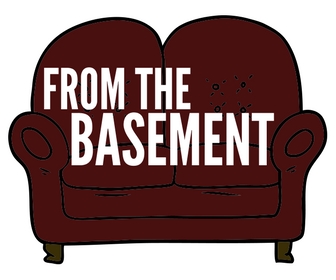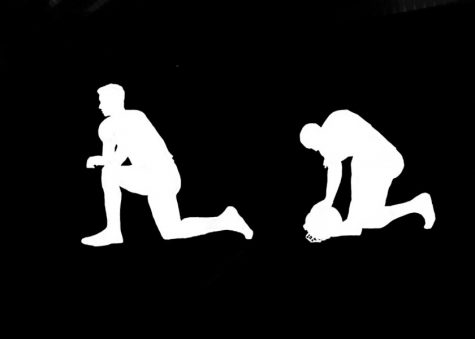From the Basement: #TakeAKnee

Paul Trujillo | Sports Layout Editor

Last Sunday, New Orleans Saints players sat throughout the national anthem before their game against the Carolina Panthers. Responding to President Donald Trump’s weekend Twitter diatribe against players protesting systemic racism by refusing to stand for the anthem, they joined dozens of players who knelt, sat or stayed off the field during the anthem on Sunday.
Many fans have voiced outrage, and others have argued that sports and politics should never intersect. These athletes, however, are not mindless marionettes, moved by the invisible strings of owners and fans alike. Instead, irrevocably bound to the color of their skin more so than the colors of any team, they can and must use their platforms to effect political change.
The recent wave of NFL protests was sparked by former San Francisco 49ers quarterback Colin Kaepernick, who started to kneel for the national anthem last year to highlight racial injustices. But for as long as black athletes have participated in professional sports, politics has been intimately intertwined with their experiences.
As an African-American track star, Jesse Owens was forced to eat and stay at different venues from his white teammates during high school. As an unapologetically black Muslim, Muhammad Ali was targeted by the press, other boxers and the FBI.
Professional sports do not exist in a vacuum, and efforts to divorce them from politics blindly ignore the fact that, for decades, the blemish of blackness has proven inseparable from the experience of African-American athletes. For these protestors, leaving politics off the field effectively amounts to a rejection of their identities, an outcome implicitly advocated for by their fiercest detractors.
To these critics, sports are a diversion, an abstract arena in which the players are lifeless pawns, engaged in a gladiatorial contest for the entertainment of spectators alone. In the comfy confines of the stadium, fans expect the satiation of their athletic appetites, not the dissenting knee of a rebellious quarterback.
As time has shown, however, the experience of the black athlete is inherently political. Once the final whistle blows, the illusion ends, and the athlete returns to a world in which his race constitutes 28 percent of arrests and 38 percent of state prisoners, all while being unemployed at twice the rate of white Americans.
In a league in which almost 70 percent of players are black, fans cannot demand athletes simply ignore this reality, shedding their skin and replacing it with an anodyne jersey for four quarters. To do so is to reject their personhood, effectively reducing games to simulated games of Madden NFL.
In their righteous indignation, some disparage the protests of Kaepernick, and others bemoan the perceived disrespect for U.S. military personnel. Undoubtedly, the American flag and anthem, in part, commemorate their sacrifices.
The flag and anthem, however, are not the sole claim of any one group. The flag’s red is awash with the blood of both the soldier and the slave, the children of Normandy and the Navajo alike.
Rather than superficially commemorate the flag’s fabric or each stanza of “Star-Spangled Banner,” then, patriotism demands we actively hold our country up to the standards of its founding ethos. In refusing to stand, these NFL players poignantly remind us that our mission remains unfinished: the final whistle has not yet been blown.
This is an opinion article and does not reflect the views of The Tulane Hullabaloo. Nketiah is a sophomore at Newcomb-Tulane College. He can be reached at [email protected].
Your donation will support the student journalists of Tulane University. Your contribution will allow us to purchase equipment and cover our annual website hosting costs.
















Leave a Comment